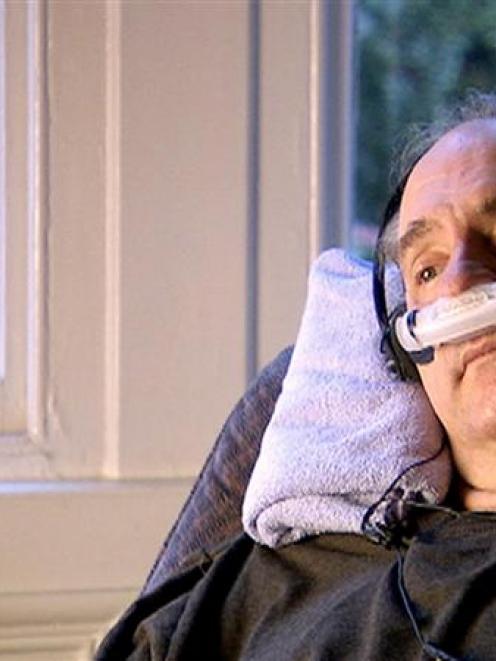
The man is shown with his wife at his bedside while he takes a number of barbiturates and turns off his ventilator. He then dies on camera. It is a draining experience, even for viewers hardened by a hundred headbanging Hollywood films.
Before he died, Craig Ewert said his decision to take his own life would mean less suffering for himself and his family.
"If I go through with it, I die as I must at some point," he said. "If I don't go through with it, my choice is essentially to suffer, and to inflict suffering on my family, and then die."
Heart-rending still photographs of the man's final moments dominated Britain's newspaper front pages yesterday - "SUICIDE TV" screamed one tabloid - and prompted a discussion in Parliament, where Prime Minister Gordon Brown was quizzed about the propriety of the decision to air the film.
The moment of death had long been a final taboo for no-holds-barred British TV, where sex and violence are common, but that line was set to be breached by "Right to Die?" the documentary about Ewert's decision to terminate his life in 2006 after being diagnosed with degenerative motor neuron disease.
His wife, Mary Ewert, wrote in the British press that her 59-year-old husband had been enthusiastic about having his final moments televised.
"He was keen to have it shown because when death is hidden and private, people don't face their fears about it," she said, adding that he wanted viewers to understand that assisted suicide allowed him to die comfortably rather than enduring a long, drawn out and painful demise.
This was written off as pure hogwash by members of Care Not Killing, an anti-euthanasia group aligned with the Catholic Church and other religious organisations in Britain.
The group's director, Peter Saunders, called it nothing more than "a cynical attempt to boost television ratings" linked to a bid to convince Parliament to legalize assisted suicide.
"There is a growing appetite from the British public for increasingly bizarre reality shows," he said. "We'd see it as a new milestone. It glorifies assisted dying when there is a very active campaign by the pro-suicide lobby to get the issue back into Parliament."
The show was set for broadcast on Sky's Real Lives channel, which draws far less viewers than Sky's myriad news, sports or movie shows, but it generated enormous publicity, with clips from the documentary broadcast throughout the day on Sky News and rival channels.
The Sky network is controlled by Rupert Murdoch, who has extensive newspaper, television and film studio holdings in the United States and throughout the world.
The documentary by Oscar-winning director John Zaritsky has previously been shown on Canadian and Swiss TV and at numerous film festivals, provoking little controversy, but it struck a raw nerve in Britain, where the divisive debate over assisted suicide remains unresolved.
Zaritsky said it would have been "less than honest" to make the film without showing the actual suicide because it would have left viewers wondering if the death was unpleasant, cruel, or carried out against Ewert's will.
"By putting it out there, and putting it out there in its entirety, people can judge for themselves," he said, adding that the documentary gives viewers an insight into how assisted suicide would work if it is legalized in more places.
The film was positively received in Canada when televised there last year, he said, but was condemned by right-to-life groups.
The televised suicide in Britain follows a well-publicized case in Florida, where a teenager killed himself on camera last month and broadcast the images live on an Internet site.
Ewert, a former computer scientist from Chicago with two children who was living in Britain when he became ill, traveled abroad to end his life because assisted suicide is still illegal in Britain.
He said he wanted to take action before the disease left him completely incapacitated.
"When you are completely paralyzed, can't talk, can't walk, can't move your eyes, how do you let someone know that you are suffering?" he asked.
He died at an apartment in Zurich with the help of Dignitas, a well-known assisted suicide group in Switzerland, where suicide is legal in some circumstances.
Dignitas founder Ludwig A. Minelli said the presence of cameras and filmmakers did not in any way influence Ewert's decision-making process.
"Ewert, because of his illness and his declared intent right from the start to shorten his own suffering, never once considered the possibility of abandoning his assisted suicide," said Minelli.
The case came up during the prime minister's question time Wednesday when legislator Phil Willis, who represents Ewert's district, complained that the film promoted assisted suicide, which is still a crime.
He asked Brown if the prime minister believed the show was "in the public interest" or simply a case of "distasteful voyeurism." Brown did not venture an opinion, saying only that the government's "television watchdogs" will scrutinize the show after it is broadcast.
Public opinion polls suggest that 80 percent of Britons feel the law should be changed to allow a doctor to end a patient's life in a case like Ewert's, but opposition from influential religious groups remains strong and the anti-suicide law remains in place.
British law bans "aiding, abetting, counseling or procuring" suicide, but courts have recently been reluctant to convict people who help loved ones to end their lives.
On Tuesday, state prosecutors said they would not charge the parents of 23-year-old Daniel James, who died at a Dignitas clinic in September.
James was paralyzed from the chest down after an accident while playing rugby.











